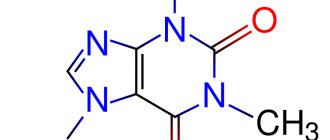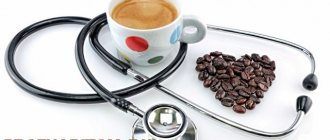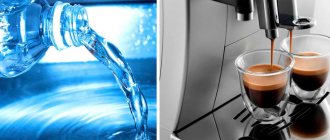When discussing issues of fluid retention in the body, coffee is the most frequently discussed topic. Some people consider it a diuretic, while others consider it the opposite, and there is no single opinion. When experts advise drinking 8-10 glasses of water a day, they usually emphasize that this does not include tea and coffee, since they retain water, but at the same time, coffee makes many people want to go to the toilet. Let's try to figure out when coffee retains water in the body, what studies have been conducted, and what kind of coffee to drink to achieve the desired effect.
Scientific research
There are few scientific studies addressing the topic of the effect of coffee on the human urinary system, so it is difficult to provide accurate statistics.
Scientists first tried to evaluate the effect of caffeine on the body in the 30s. XX century 3 men took part in the experiment. They alternated between drinks such as coffee, tea and water. Urine volume indicators did not change with daily use of only the first two. But after the subjects began to drink water, the frequency of urination increased.
A Connecticut Institute study of 15 people found that regularly drinking a small dose of caffeine did not increase the volume of urine, but the body excreted more fluid because. Caffeine abuse saturates the kidneys with sodium, which is excreted in the urine.
An experiment was also conducted in Birmingham, UK, during which the first group of volunteers drank 4 cups of coffee a day, and the second group drank 4 glasses of water.
The urine volume indicators in the 2 groups did not differ from each other: the level of water in the body remained normal. The experiment demonstrated that the diuretic effect is acquired from the number of cups drunk per day.
That is, in small doses, caffeine does not cause dehydration and does not act as a diuretic.
Does coffee help get rid of swelling?
Ph.D., cardiologist Anton RODIONOV.
The most common myths and popular methods of dealing with this not at all harmless phenomenon are analyzed by our expert - Ph.D., cardiologist Anton RODIONOV
Myth 1. Those who drink a lot of water and eat salty foods become bloated.
This is not entirely true. In fact, there are people who, without any damage to their health and appearance, can drink 3 - 5 liters of liquid a day, while for others, due to an extra couple of glasses of water, their arms and legs swell.
By the way, it is not entirely true that edema occurs from excess salty food - this is not the cause, but only a provoking factor.
The most important thing you need to know: a healthy person should not have edema. Excess salt is excreted by the kidneys and is not retained in the body. The same goes for water - liquid is removed from the body and is not retained in the tissues.
Therefore, the appearance of edema is always a sign of trouble in the body and a reason to consult a doctor.
IMPORTANT!
On average, a person consumes 1.5 - 2 liters of water per day. This does not mean that you need to drink 8 glasses of liquid. A significant portion of water enters the body with food.
It is recommended that a healthy person consume no more than 8 g of salt per day; those suffering from cardiovascular diseases - no more than 5 g. Cardiologists recommend, especially for hypertensive patients, to cook food with a small amount of salt and not to add salt after cooking.
Myth 2. The most common cause of edema is diseased kidneys.
Nothing like this!
Most often, people suffer from swelling of the legs, the reason for this is peripheral venous insufficiency due to disturbances in the venous valve system of the legs. Blood cannot return completely to the heart and stagnates in the veins.
In second place are edema due to chronic heart failure and other cardiovascular diseases.
In such cases, doctors recommend limiting salt intake, because excess sodium in the blood leads to fluid retention and increased blood pressure. The load on the heart increases, blood “stagnates” in the body, and swelling occurs.
Kidney diseases (nephritis, diabetes and others) are in third place among the common causes of edema. By the way, it is renal edema that most often “imprints” on the face. Therefore, if swelling on the face, in particular in the eye area, occurs frequently, then tea compresses or all kinds of cosmetic masks will not help, you need to check your kidneys.
Myth 3. Diuretic teas are the simplest and safest remedy for edema
This is absolutely not true! Any independent attempts to regulate the volume of fluid in the body can lead to complications - heart rhythm disturbances, convulsions. Therefore, before taking diuretics, dietary supplements or traditional medicinal diuretics (diuretics), it makes sense to consult a doctor.
Myth 4. Parsley removes excess water from the body
Indeed, there are foods and drinks that contain a lot of potassium and phytochemicals and affect the restoration of the correct sodium-water balance in the body.
Popular rumor ascribes such properties to black or green tea, chamomile tea with lemon juice, fresh cucumbers, asparagus, celery, eggplant, and seasonings - parsley, coriander, cardamom.
However, in fact, the importance of the listed products is greatly exaggerated.
In fact, cranberry and lingonberry juice have a diuretic effect, as well as, oddly enough, coffee (without harm to health, 1 - 2 coffee cups per day).
Advice on topic
Half an hour into shoulder-deep water and you’ll be like a cucumber!
The most unpleasant and painful thing is leg swelling due to peripheral venous insufficiency. There are several effective ways to remove it:
lymphatic drainage massage - reduces swelling by removing excess fluid from tissues;
elastic bandaging and special knitwear (socks, stockings) prevent fluid stagnation;
raise swollen feet above the level of the heart - the elevated position of the legs promotes the outflow of blood;
immerse yourself in water up to your shoulders for half an hour or 30 minutes and do water aerobics - in water the influence of gravity weakens and the blood does not stagnate in the veins;
Walk for at least 45-60 minutes a day - contraction of the leg muscles is a kind of “pump” that squeezes blood out of the veins of the lower extremities, reducing venous stagnation.
Is coffee a diuretic?
Dosed coffee consumption does not interfere with fluid regulation. The diuretic effect is felt by people who are not accustomed to caffeine. To prevent the body from becoming dehydrated, experts advise drinking more water to restore balance.
This effect is achieved due to the content of vasoconstrictor substances, which enhances filtration in the glomeruli of the kidneys, and urine is excreted faster. But with moderate use of the alkaloid, the frequency of the urge to urinate increases, and not the amount of fluid produced by the body.
If there is no tolerance to caffeine, then you need to compensate for it with a large consumption of water, drinking 2-3 liters per day.
The nuances of drinking coffee as a diuretic
In the absence of contraindications, coffee can be used as a diuretic. The main thing is not to abuse this drink, follow a number of recommendations so as not to harm the body.
Recommendations
Coffee is a diuretic, but only when consumed in moderation. To get rid of excess liquid, it is recommended to drink the drink in the morning. To brew coffee beans, you can use a cezve, French press, coffee machine or coffee maker.
To enhance the effect of espresso, it is recommended to add the following components:
- cinnamon;
- lemon;
- cocoa;
- ginger;
- cardamom.
It's worth remembering that Espresso cannot be used as a diuretic on an ongoing basis. It can cause serious harm. Therefore, if you have problems removing fluid from the body, you should consult your doctor.
Who shouldn't drink
Not everyone will benefit from the diuretic effect. Drinking drinks containing caffeine is contraindicated in the following cases:
- kidney diseases;
- pathologies of the cardiovascular system;
- childhood;
- pregnancy;
- atherosclerosis;
- sleep disorders;
- high blood pressure;
- tendency to allergic reactions;
- problems in the gastrointestinal tract;
- elderly age;
- nervous disorders.
In addition, it is contraindicated to drink coffee on an empty stomach and immediately after eating. It is recommended to wait at least half an hour after eating to prevent negative effects on the gastrointestinal tract.
A cup of espresso or Americano can cause frequent urination. This effect is due to the presence of caffeine in the composition. True, such changes are not always observed. If a person drinks such drinks regularly and in large quantities, the body begins to get used to the effects of a natural stimulant and stops responding to it. In this case, fluid begins to accumulate in the body, rather than being removed from it. Therefore, the opposite effect is observed - swelling appears.
Which coffee has a stronger effect?
Each connoisseur will find its own taste, variety and variety: ground, instant, with milk, cream, syrups, etc. Since additives reduce the concentration of caffeine contained in the drink, its effect on the body varies.
Ground
150 ml of natural coffee contains 110 mg of caffeine.
Highly concentrated ground coffee affects:
- maintaining the central nervous system;
- normalization of cardiac activity;
- increased production of stomach acid, which stimulates digestion;
But excessive caffeine consumption can lead to dehydration.
Soluble
This coffee is most often made from robusta, an evergreen coffee tree, in which the alkaloid content is 3 times higher than in Arabica. But manufacturers claim that the instant drink contains less caffeine than natural beans. And this will be true only if you prepare coffee with a proportion of 1 tsp. powder per 250 ml of water.
Sweet
Sugar is added to enrich the taste, and the content of a large amount of fast carbohydrates negatively affects the body.
1 g of carbohydrates saves about 4 g of water. For 1 cup of coffee drink there is an average of 1 tsp. sugar, which is 10-15 g of simple carbohydrates. Sweet coffee causes more swelling.
With milk
Milk is not included in the correct drinking diet, because... perceived by the digestive tract as food. The effect of the alkaloid is suppressed by milk only in the gastric mucosa, therefore such drinking is recommended for stomach diseases.
Dairy additives slow the absorption of caffeine, thereby prolonging the diuretic effect, although the latte may seem lighter than an Americano.
Cafein free
The caffeine-free drink is safe for the body’s excretory system, because it contains virtually no caffeine, and this substance determines the diuretic effect on the body. Dikaf is harmless for hypertensive patients and people with cardiovascular diseases.
Does coffee retain fluid in the body?
Coffee retains water in the body when consumed in excess. Against this background, swelling may appear. True, the effect largely depends on what kind of drink a person drinks. Caffeine is also known to be found in cola, tea and chocolate, but these foods do not cause frequent urination.
Liquid is retained when drinking the following drinks:
- Coffee with milk . Dairy products can lead to water retention. Thanks to its addition to the drink, a barrier is created for the penetration of caffeine into the bloodstream.
- Adding sweet syrups and sugar. At the same time, the amount of urine decreases.
- Low caffeine concentration. It is noted that the more alkaloid is contained, the stronger the diuretic properties.
Natural coffee retains more liquid than instant coffee
Supplements with carbohydrates, spices and fat
Does coffee retain water in the body or not if sugar, milk, spices or salt are added to it:
- Sugar is a carbohydrate. There is a theory that 1 gram of carbohydrates eaten retains 4 grams of liquid. But carbohydrate products and glycogen burn very quickly, so they do not greatly affect health.
- Fat - animal or milk - is broken down through very complex biochemical reactions, so it is more reliable and profitable for the body to store water reserves in adipose tissue. This explains why the consequence of dehydration is uncontrolled weight gain. At the same time, regular training cannot dispose of it and make it melt. We need more complex mechanisms that lie in changing the way we eat.
- Some people add salt to their coffee to add a sharp taste. We must not forget that sodium causes swelling if a person drinks little water. Again the same defense mechanism.
We can conclude: if you need to eliminate congestion in tissues, you need to drink coffee without sugar, heavy cream, or milk.
Congestion is eliminated not only by the diuretic, but also by the laxative properties of coffee beans. In this case, the liquid is poorly absorbed in the intestines and there is a frequent and sometimes sudden urge to visit the toilet.
Spices and their effect on water retention
Diuretic spices that are added to coffee include:
- saffron, but use it carefully - in fresh form, an overdose of the spice is dangerous;
- anise;
- cumin – diuretic and choleretic spice;
- caraway;
- cardamom is a diaphoretic and diuretic.
Spices that retain liquid include:
- coriander;
- ginger;
- carnation.
You can add spices to increase or decrease the diuretic effect or water retention in coffee.









